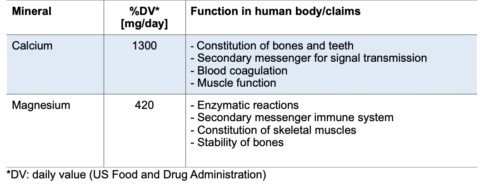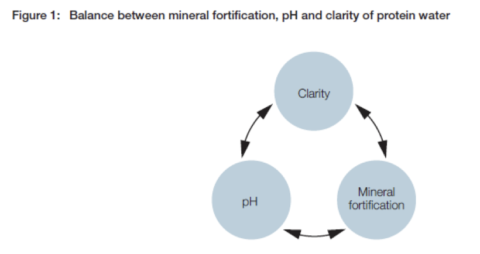Solutions for Fortified Protein Beverages
The demand for functional beverage is booming, the market addresses trending demands such as hydration, immunity, relaxation, concentration, energy, and nutritional benefits.
Proteins are added to a variety of beverages for functional and nutritional benefits. Whey proteins are the preferred protein source for sports drinks due to their high nutritional quality and easy digestion. Fortified protein beverages usually contain between 3 -7% protein and they are classified according to their pH value: neutral pH beverages are typically known as shakes and acidic pH beverages which have a clear refreshing appearance, are known as protein waters.
Protein waters constitute an appealing and refreshing high-protein alternative to the traditional shakes. However, product developers face many challenges when working on this type of product, such as the strong off-taste of whey proteins, astringent mouthfeel, beverage clarity influenced by pH, and mineral addition that could impact the stability of the proteins.
Jungbunzlauer offers solutions for protein waters, such as off-taste masking, natural acids for acidification, and high bioavailable sources of calcium and magnesium salts for mineral fortification.
Taste Improvement with ERYLITE® Erythritol
Whey proteins exhibit undesirable off-tastes arising mainly from lipid and protein oxidation during processing and storage. Products containing whey protein are often associated with cooked milk, bitter or soapy descriptors. In addition, acidic whey protein beverages tend to exhibit an astringent mouthfeel.
ERYLITE® is a fermentation-based polyol that is permitted in the US in sugar-reduced and no added sugar beverages, up to a maximum concentration of 3.5% (w/w). It has a high digestive tolerance, zero caloric value, and zero glycemic indexes. ERYLITE® is known to be a highly effective flavor enhancer. Jungbunzlauer’s research demonstrated that the addition of 1.6% ERYLITE® to protein water improved the overall taste profile by reducing the whey protein off-notes, thus improving the flavor and sweetness profile.
Phosphoric acid replacement
Whey proteins have to remain soluble to ensure the clarity of the protein water. They are most soluble at pH values above or below their isoelectric point, so a pH between 2.0 and 3.5 should be targeted. Acid selection is key; not only are acids functional, but they can have a great impact on taste. Acid type has also been shown to correlate with the astringency of protein waters.
Many protein waters on the market are acidified with phosphoric acid which is a strong acid that can impact the astringency and overall taste of the beverage. Ongoing regulatory scrutiny and a consumer desire for more natural products drive suppliers to search for cleaner label alternatives with the same functionality. In contrast to phosphoric acid, which is produced by chemical processing, all Jungbunzlauer acids are fermentation-based.
Jungbunzlauer investigated the influence of citric acid, lactic acid, and gluconic acid on the acidity and overall taste of protein water containing 5% WPI and performed a comparison with phosphoric acid.
Table 1. Acids tested in protein water
Protein waters acidified with pure organic acids and organic acid blends exhibited the same clear appearance as the protein waters made with phosphoric acid. Depending on the initial pH of the whey protein isolate, which is affected by processing, larger quantities of organic acids are necessary to achieve a target pH of 3.2 due to their lower acid strength.
Our results showed that protein waters made with citric acid/gluconic acid (50:50) blend had a more balanced acid-sweetness profile, and were perceived as fruitier and more refreshing than the ones made with phosphoric acid. Citric acid provides a tart and sharp sourness that dissipates quickly, which promotes the refreshing nature of the protein water. On the other hand, gluconic acid has only approximately one-third of the sourness of citric acid but exhibits a long-lasting acidity and mild taste profile that complements citric acid.
Depending on the flavor and source of protein (e.g. plant-based proteins), other acid blends such as citric acid/lactic acid should merit further research.
Mineral fortification with calcium and magnesium
Protein waters usually contain as few ingredients as necessary to avoid cloudiness and ensure stability. Mineral fortification is a particularly sensitive issue in recipe development due to the related buffering effect and stability issues. However, consumers expect certain functionalities and nutritional value when consuming protein beverages, making mineral fortification attractive to product developers and marketers.
Calcium and magnesium rank among the most abundant minerals in the human body. Their main functions and approved daily recommended intakes are summarized in table 2. In general, organic mineral sources show better bioavailability, higher solubility, and better organoleptic qualities than inorganic mineral salts.
Table 2. Functions of calcium and magnesium in the human body
The addition of 10% DV magnesium and calcium was possible with Jungbunzlauer’s fermentation-based calcium lactate gluconate (CLG) and magnesium lactate (ML). These ingredients were completely soluble in the protein water matrix. There was a slight increase in pH, arising from the buffering effect of the minerals, which did not affect the clarity of the protein water. This level was a good compromise between adequate mineral fortification and clear appearance of the drink without additional pH adjustment.
Depending on the initial pH of the whey protein isolate and the amount of acid present in the recipe, a further adjustment of the pH might be necessary to guarantee high clarity of the protein water for the duration of its shelf life. The same adjustment applies if higher amounts of minerals are added because the balance between mineral fortification, pH, and clarity of the drink should always be a top focus (Fig 1).
Calcium lactate gluconate and magnesium lactate are promising mineral sources if adjusted carefully to the recipe. In addition to calcium and magnesium fortification, the incorporation of potassium and zinc salts as citrates or lactates is also possible.
Conclusion
Protein waters are a challenging task for product developers. Several Jungbunzlauer ingredients have a high potential for improving these beverages. ERYLITE® can improve the taste of protein waters by boosting flavor and providing mouthfeel and body. Moreover, a combination of citric acid and gluconic acid was shown to be a more natural and tasty alternative to phosphoric acid. Finally, calcium lactate gluconate and magnesium lactate were validated as solutions for mineral fortification without impact on taste and clarity of the beverage.
Written by:
Nadja Heinzmann
Ferid Haji
Monica Garces




